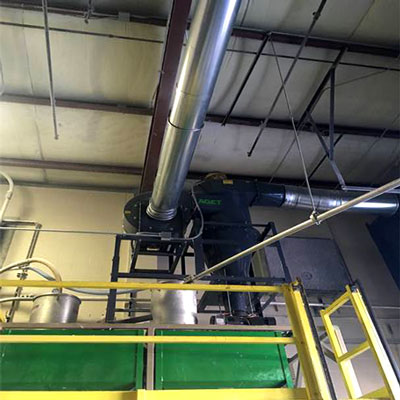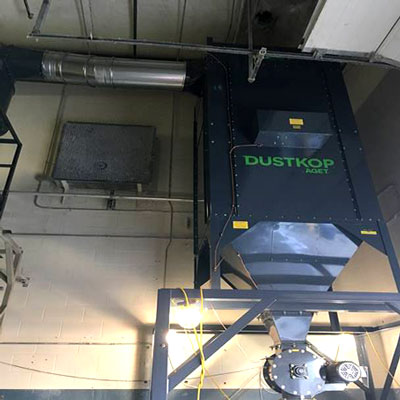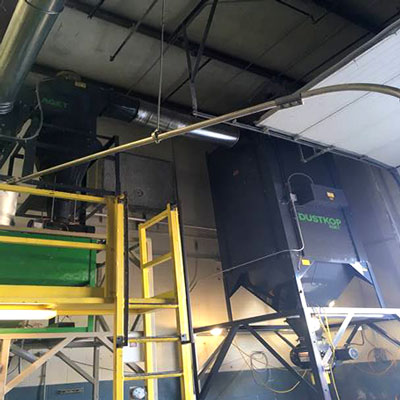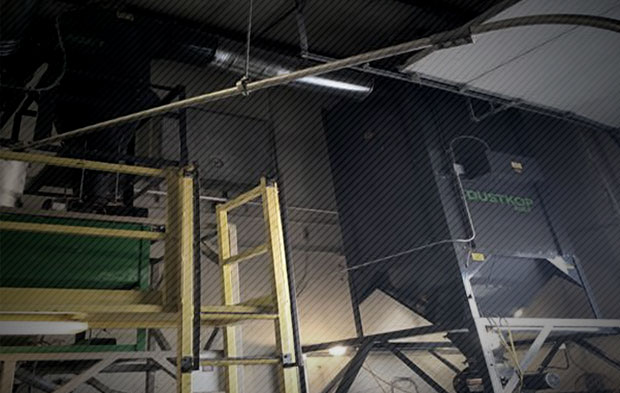AGET Case Study: Plastic Regrind Dust Collection
Plastic blow mold companies rely on multiple knife blade grinders to re-process their scrap flashings. These grinders reduce the scrap into small particles for re-melting in the extruder machine. Transport of the plastic re-grind at this facility was done by high pressure 2” diameter pneumatic transport pipe directly attached to the grinder bottom outlet. The grindings were conveyed to a small cyclone and then pneumatically conveyed back to the extruder. This process created constant plugging inside the grinder, and the friction of blades and plastic created excessive heat, smoke, and fires within the grinders. The smoke constantly filled the production area with noxious fumes, and resulted in continuous maintenance downtime. The existing system was also allowing excessive amounts of fine particles to pass through to the extruder, creating flaws in the blow molded parts. For these reasons, a new system was sought by the manufacturer.
A Thorough Review
AGET Manufacturing Company was contacted by the manufacturer of the plastic grinding machines in response to complaints from customers. A meeting was set to evaluate the current system performance and recommend an improved system. During a thorough review of the system in operation, one of the grinders jammed, causing a fire inside the unit. It was apparent that an immediate solution was required.
The Solution: An AGET High-Pressure, High-Volume Cyclone
AGET Manufacturing developed a proposal to remove the existing pneumatic transport system and replace it with an AGET high pressure, high volume cyclone. The DUSTKOP cyclone would be placed above the existing plastic storage hopper, and the bottom outlet of the cyclone was fitted with a static-eliminator spool. Under the transition spool, a rotary vane feeder was attached. This rotary valve served three functions: an airlock, a metering device, and an ‘air-wash’ mechanism. Spacers added between the top flange and transition spool allowed air to enter the bottom of the cyclone, creating the ‘air-wash’ effect for the plastic regrind. The uniform plastic pellets pass through the rotary valve into the hopper, and are transported to the extruder for re-melting. The extremely light plastic dust exits the cyclone and is captured directly into an AGET baghouse after-filter. The after-filter bottom hopper was fitted with a rotary vane feeder, which empties the fine particles into large boxes for removal. Both the DUSTKOP cyclone and after-filter were grounded and bonded by AGET, to remove the static charge build-up created by handling the plastic material. The after-filter tubes were also furnished with grounding wires to assure no static build-up inside the filtration tubes.
The Details
Each plastic grinder is fitted with a 4” diameter intake that collects and transports all plastic regrind as it is produced, allowing no buildup to occur. An additional benefit of the increased airflow kept the grinders much cooler, improving their performance.
AGET also provided a main control panel with a variable frequency drive. This gives the production department the ability to increase grinding volume, or decrease upon production requirements. The result was realized savings on energy costs.
The AGET system operates at a substantially reduced noise level compared to the previous pneumatic rotary lobe blower, and eliminates the excessive heat that the blower created.
The Result: Zero Grinder Down Time
Overall, the production department is extremely happy with the new AGET Manufacturing transport system. They are now seeing zero grinder down time from plugging, no smoke or fires, a cooler operating temperature, and no dust buildup on the floors, machines, or finished parts.
Get A Custom Solution
For your most demanding plastic regrind and processing applications, AGET Manufacturing can tailor a custom solution to meet the needs of many different operations. Contact AGET or one of their knowledgeable representatives today to start developing a better solution for your plastics processing problem!



